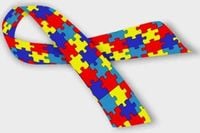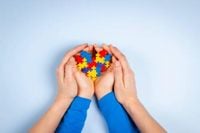On April 2, 2025, the world observes World Autism Awareness Day, a date established by the United Nations in 2007 to promote acceptance and inclusion of individuals with Autism Spectrum Disorder (ASD). This significant day serves as a reminder of the pressing need to deepen our understanding of autism, combat stereotypes, and ensure that fundamental rights—such as access to education and healthcare—are guaranteed for people on the spectrum.
Psychologist Mel Oliveira, a clinical therapist specializing in children with autism since 2021, emphasizes the importance of this day in raising visibility and challenging stereotypes. "When we share information about autism, especially on social media, we reach people who may not have been exposed to this reality before. This helps to demystify stereotypes and encourages public policies aimed at improving access to education, health, and employment for autistic individuals," she states.
Psychologist Gustavo Queiroz, a graduate of the Federal University of Ceará (UFC), also speaks to the importance of the day in advocating for the rights of autistic individuals. He notes that celebrating historical dates like this one serves more as a remembrance of a struggle rather than mere celebration. "Historically, autistic individuals have faced various forms of violence, and they continue to experience discrimination today," he adds.
Autism Spectrum Disorder (ASD) is a neurodevelopmental condition that affects communication, social interaction, and behavior. The spectrum is broad, meaning that each autistic individual may exhibit different levels of support needs and unique characteristics. According to the World Health Organization (WHO), approximately 1 in 100 children worldwide is diagnosed with ASD. In Brazil, Law 12.764/2012 established the National Policy for the Protection of the Rights of Persons with Autism Spectrum Disorder, promoting public policies for inclusion.
Despite legal advancements, significant challenges remain. Queiroz points out, "The educational and academic inclusion of autistic individuals remains a major obstacle today. While medication may address some issues, it often creates new problems. Beyond normalizing autism, we need to support individual differences."
One of the main challenges highlighted by Oliveira is late diagnosis, which is crucial to prevent greater difficulties in motor, social, and educational development. "Early diagnosis is essential to avoid larger issues down the line. The sooner we identify the disorder, the better we can work on social skills and learning," she explains.
Access to specialized therapies also poses a critical challenge. "Unfortunately, the therapies needed for autistic individuals, such as speech therapy, occupational therapy, and music therapy, are often very expensive. Treatment is not accessible for most families, which hampers the proper development of children," Oliveira adds.
Moreover, prejudice and social exclusion continue to be barriers to the acceptance of autism in society. Oliveira stresses that "a person is not defined by their autism; they are so much more than their diagnosis. Autism is just one characteristic of the whole person."
As we observe World Autism Awareness Day, it is imperative to recognize the importance of raising awareness and fostering respect for differences. Queiroz emphasizes that discussions surrounding autism should center on recognizing the uniqueness of each individual. "It is essential to celebrate differences and mark a historical struggle on a day like this," he says.
Education about autism should begin at home, according to Oliveira. "Respect is fundamental. Parents of neurotypical children need to teach the importance of accepting differences from an early age. This would create a much more inclusive world," she notes.
Oliveira also highlights that combating prejudice is not solely the responsibility of families; effective government action is crucial. "It is essential to advocate for public policies that make treatment more accessible. Many families cannot afford therapy costs, and this inequality needs to be addressed," she insists.
World Autism Awareness Day is not just a day for awareness; it is a call to action. It is a reminder that autism is not a disease but a condition that is part of human diversity. The examples of notable individuals, such as actor Anthony Hopkins, who revealed his autism diagnosis later in life and credited his success to his unique cognitive abilities, illustrate that autistic individuals can achieve great things when provided with support and understanding.
Greta Thunberg, diagnosed with Asperger's Syndrome, refers to her condition as a "superpower" that aids her in her environmental activism. Similarly, singer Sia recently disclosed her autism diagnosis, demonstrating how art can serve as a powerful means of expression for autistic individuals, allowing them to connect with the world in unique and impactful ways.
Temple Grandin, one of the most recognized autistic personalities globally, overcame challenges to become a respected scientist in animal welfare and an advocate for autism awareness. Her experiences and advocacy work have significantly contributed to the understanding of autism, highlighting its complexities.
Symbols associated with autism awareness include the puzzle piece, created in 1963 by the National Autistic Society, representing the complexity of ASD and the diversity of individuals within the spectrum. The colorful infinity ribbon, adopted more recently, symbolizes inclusion and diversity, emphasizing that autism is a natural part of human neurodiversity.
In Brazil, the Academia do Autismo was founded by Fábio and Mayara Coelho, parents of autistic children, to raise awareness and disseminate information about autism. Their journey began with the National Autism Symposium Online in 2016, which aimed to raise funds for the reopening of the APAE in São Pedro da Aldeia (RJ). The initiative has since grown significantly, with over 600,000 followers and more than 50,000 students enrolled in their courses.
Ultimately, World Autism Awareness Day serves as a crucial reminder of the importance of inclusion and respect for differences. Autistic individuals can achieve remarkable accomplishments when they receive the necessary support and understanding. Furthermore, initiatives like the Academia do Autismo play a vital role in spreading information and supporting families and professionals. Raising awareness is the first step towards creating a more inclusive and welcoming world for all.







